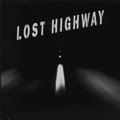Lost Highway
 Various Artists
Various Artists
Lost Highway
Nothing / Interscope, 1996
The Smashing Pumpkins, wallowing in the hangover of their hit album Mellon Collie and dealing with the fallout from a touring member's heroin overdose, weren't the only band in flux in 1996. Trent Reznor of Nine Inch Nails was suffering from a similar affliction in the wake of The Downward Spiral, an album that had turned him into the pin-up boy for malcontent but that was so overwrought it couldn't possibly be topped. He had begun working instead with David Bowie, who was mid-way through one of his own regular musical reinventions. Lurking in the shadows was Brian Warner, who was about to go from Reznor's session musician and part-time freak to the world's most hated man as Marilyn Manson. All four names came together to contribute to the soundtrack of David Lynch's Lost Highway.
The film was about a paranoid musician who murders his wife and suffers a psychotic break while in jail, imagining himself as – or to take it literally, transforming into – a young mechanic who has an affair with the same woman in an earlier life. The alternate reality plays out like the sexual subconscious of a traumatised boy, awkward in some parts and sadomasochistic in others, shot in a lush visual style that could be classed as artistic erotica. The soundtrack was just as extravagant, alternating between dark pop songs and the sultry jazz pieces of Angelo Badalamenti and Barry Adamson. There is one saxophone solo in particular that, I sometimes think, would actually drive someone insane if they didn't already have a tolerance for sound – like what would happen if a person drank twenty cocktails on their first ever night out.
The most decadent songs were from The Smashing Pumpkins and Marilyn Manson. The former's contribution, 'Eye', was a bittersweet electronic track with a slow pulse and a synthesiser designed to sound like a harpsichord that bloomed into pure aural ecstasy. Manson's 'Apple Of Sodom' was predictably sacrilegious, but unlike most of his later work went for a sustained feeling of revulsion over flashy shock value. The most disappointing were Reznor's two original pieces 'The Perfect Drug' and 'Driver Down'. The songs themselves were fantastic, weaving the sounds of drum'n'bass and jazz into his trademark industrial noise. The problem was that instead of elaborating on that style on his next album, Reznor tried to recreate his persona as the most tortured man alive and made a mockery of himself along the way.
No comments:
Post a Comment